FESTIVITIES IN BALI
Bali is an island full of culture, artistic manifestations, celebrations, and festivities. The Balinese as being Hindus, have holidays, rituals, and festivals that for the tourists are of great interest. Also, they dedicate a lot of time on the preparation of the offerings, rituals and ceremonies for the many festivities they celebrate throughout the year. One of the best experiences of traveling to a place with such a different culture is to find yourself in the middle of religious or native festivities and, in this way, connect with the local culture. Most likely, during your trip to Bali, you will encounter some celebration, and it is interesting to know what is going on around you. Some of the religious ceremonies are based on the Balinese calendar and others on the Hindu calendar. Below we explain how calendars work in Bali and which are the main religious and artistic festivals that take place on the island throughout the year.
Calendars in Bali
As strange as it may seem, the Balinese use three calendars simultaneously: the Pakwon calendar, the Saka calendar and our Gregorian calendar.
Pakwon Calendar - Balinese calendar
The Pakwon calendar is the Balinese calendar and is used only in Bali. This calendar is used to mark the sacred days and the most favorable days for certain activities. When choosing a day to get married, to plant something, or even for activities such as buying a car or getting a haircut, which we are used to do on the day that best suits us, the Balinese consult their own calendar to find the best day to do them.
The Balinese calendar has 210 days and starts on Kuningan day. In addition, this calendar is the one that marks most of the festivities that are celebrated in Bali and some of them even repeat in a year of 365 days. For example Kuningan, is the first day of the Balinese calendar and is celebrated every 210 days. So, according to the Gregorian calendar that we use, Kuningan is celebrated twice in a year of 365 days. To make it better understood, we take the year 2020 as an example. If the Balinese New Year were to begin on 1 January, 28 July 2020 would be the first day of the following year. To make things even more interesting, the Balinese do not live in the same year as us. The Balinese calendar started to be used in the year 78 of the Julian calendar (the previous one to the Gregorian, but very similar) so the year 2020 for the Balinese is actually the year 1942.
Saka Calendar - The hindu or lunar calendar
The Saka calendar is the lunar calendar and is also the official calendar of India. Bali, being an hindu island, also uses this calendar. Unlike the Pakwon calendar, which has 210 days, according to the Saka calendar, the year is approximately the same length as a Gregorian calendar year. The Saka year consists of 12 lunar months, and each month has 29 or 30 days. To synchronize with the solar (Gregorian) calendar, every 30 months, an additional month is added, as if it were a leap month. This Saka calendar starts on the day of Nyepi, which usually falls in March. The Balinese use the Saka calendar for administrative and work purposes, but also some Hindu holidays.
Gregorian calendar - Solar calendar
The Gregorian calendar is the solar calendar and the one used by the vast majority of the earth’s population. As an island that receives millions of tourists every year, Bali needs to use the Gregorian calendar as well to be in tune with the rest of the world and to avoid confusion about dates.
Now that we are clear about how calendars work in Bali let’s see what the festivities are celebrated in a 365-day year.
Religious Festivities in Bali
Galungan and Kuningan - the Balinese New Year
The celebration of Galungan and Kuningan lasts ten days and marks the Balinese New Year. On Galungan day, the creation of the universe is celebrated with the victory of the good (Drahma) over the evil (Adrahma).
On Galungan Day, Balinese people gather in their family temples to receive the visit of their ancestors and the gods who descend to the earth. The preparations for this festival begins a few days before, and the Balinese prepare offerings and penjar, large ornamental poles made of bamboo cane, palm leaves, and coconut that decorate the houses, roads, and temples during these festivities.
Kuningan Day is the last day of these celebrations and is when the ancestors return to heaven after visiting the earth during Galungan. Before noon, offerings are given to the ancestors and the gods before their return to heaven. On Kuningan day, the Balinese are purified, and with the clean and renewed spirit, they celebrate the first day of the Balinese New Year.
As mentioned, these festivities are celebrated twice in a year of 365 days, with a difference of 210 in between.
Galungan 2020 – 19th February and 16th September
Kuningan 2020 – 29th February and 26th September
Galungan 2021 – 14th April and 10th November
Kuningan 2021 – 24th April and 20th November
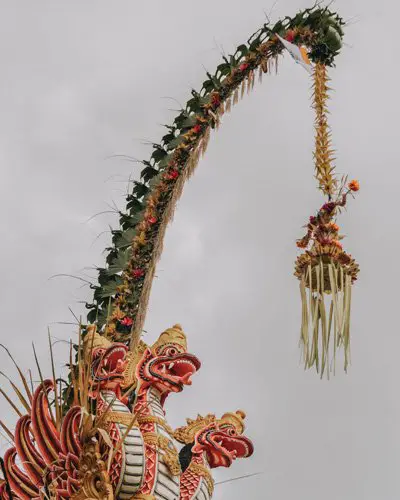
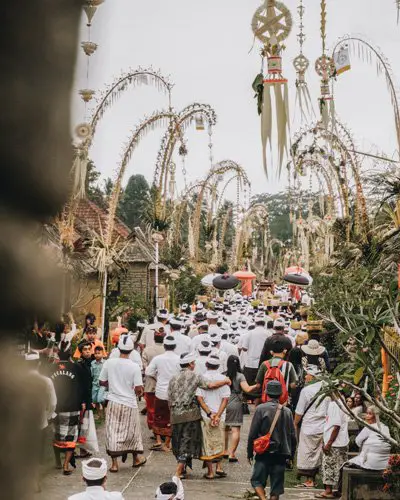
Maha Shivaratri - The Night of Shiva
Maha Shivaratri means the great night of Shiva and is a famous Hindu festival held every year in honor of the god Shiva.
According to legend, on a moonless night, Parvati (the wife of the god Shiva) prayed and meditated so that nothing terrible would happen to her husband on such a strange night. Since then, on Maha Shivaratri’s day, married women pray for good luck of their husbands and children, and single women pray to find a perfect husband like Shiva.
Maha Shivaratri is also a day when Balinese people ask for forgiveness for their sins. The day before Maha Shivaratri, the Balinese fast and stay up all night meditating and practicing yoga.
Maha Shivaratri 2020 – 21st February
Maha Shivaratri 2021 – 28th February
Melasti - Water purification
Melasti is a Hindu religious ritual performed three days before Nyepi, the day of silence. The Balinese perform the Melasti ritual to cleanse themselves of the sins and the bad karma through a symbolic act called Tirta Amerta, the water of life. Tirta means water, and Amerta means immortality. During this festival, the Balinese pray and bathe in the water temples (Tirta Empul or Tirta Gangga), in rivers, beaches or lakes to purify themselves .
Melasti 2020 – 22nd March
Melasti 2021 – 11th March
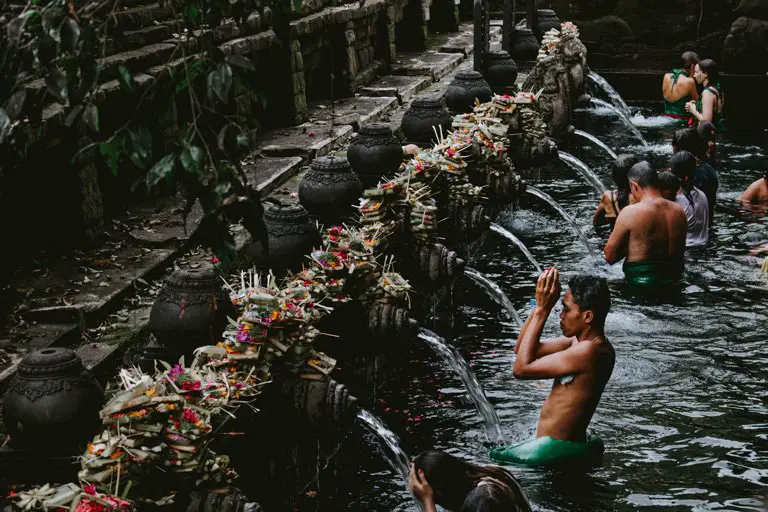
Pengerupukan and the Ogoh-Ogoh Parade
Pengrupukan is a ceremony that takes place the day before Nyepi (the day of silence) to expel bad energies and evil spirits from the island. That same day there is a parade of Ogoh-Ogoh, which are giant statues made of paper and glue. The Ogoh-Ogoh represents demons, people, or objects that disturb the life of the humans. The Balinese believe that the meeting point of the demons is at the main street intersections of the towns, and is there where they take the Ogoh-Ogoh. When the parade ends, they burn the Ogoh-Ogoh in the cemeteries to put an end to the evil present on the island.
Pengrupukan 2020 – 24th March
Pengrupukan 2021 – 13th March
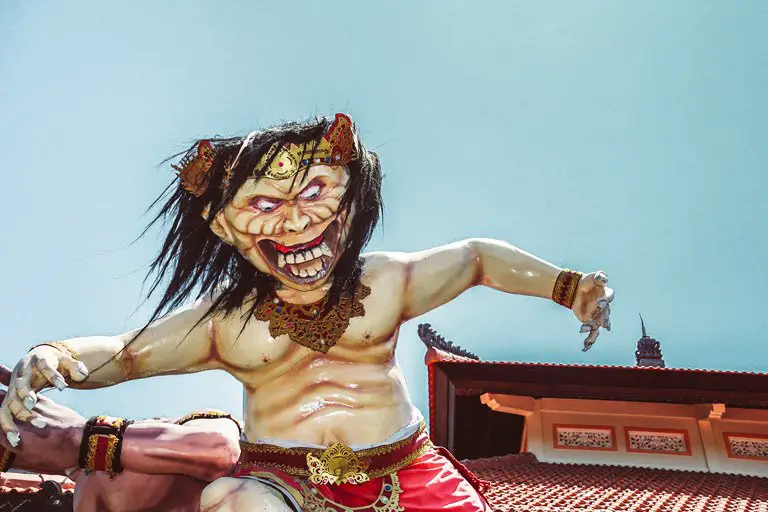
Nyepi - The day of silence
Nyepi is one of the most important celebrations in Bali, but unlike other festivities, this day is celebrated in absolute silence. Nyepi, known as the day of silence, is the celebration of the Hindu New Year according to the Saka calendar. On the day of Nyepi, the entire island remains in silence, and no activities are allowed in Bali starting 6:00 am and during 24 hours.
Things you need to know if you spend Nyepi day on the Island of the Gods:
- It’s forbidden to leave the house
- It’s forbidden to work
- All shops, restaurants and other businesses are closed
- Bali airport remains closed for the 24 hours of Nyepi
- Is forbidden to light fire
- There’s no internet connection during Nyepi
- The only services that remain active are emergency services and maternity hospitals
- If you want to listen music or watch TV, you need to keep the volume to a minimum
- There are special patrols called pecalang that walk on the streets to make sure that Nyepi rules are respected. The pecalang can enter houses and arrest families who have their lights on or do not respect the imposed silence.
All these restrictions are because the Balinese believe that evil spirits inhabit the island to torment people’s souls. The aim of keeping silent for 24 hours is to mislead the demons and make them think that Bali is an uninhabited island. As there is no movement on the island for a whole day, it’s said that the demons will leave Bali to look for other inhabited places where they can continue to torment people.
The Balinese take advantage of Nyepi and they meditate and rest, and we recommend you to do the same. Although it may seem like a lost day because you can’t do any activities, give yourself this day of rest and disconnection.
If you spend Nyepi day in Bali, please be respectful to the Balinese and their religion and follow the rules.
Nyepi 2020 – 25th March
Nyepi 2021 – 14th March
Ngembak Geni and the kissing festival
The day after Nyepi, everything returns to normal, and the Balinese celebrate Ngembak Geni. That day, the Balinese visit their families, eat together and forgive each other to start the Saka New Year with good energies.
One of the most peculiar traditions for Ngembak Geni day is Omed-Omedan, the kissing festival celebrated in Denpasar, the capital of Bali. Singles between ages 17 and 30 gather on the street and separate into two groups: the women on one side of the road and the men on the other side. When they hear a signal from one of the village leaders, they all approach in the middle of the road, and the men pull the woman they like towards them, hugging and kissing each other while the village elders pour water on them. This ceremony has become a meeting place for single Balinese people, and many couples have met in this way.
Ngembak Geni celebrations in 2020 and 2021
Ngembak Geni 2020 – 26th March
Ngembak Geni 2021 – 15th March
Saraswati - Wisdom Day
Saraswati is the day of knowledge and a festivity dedicated to the goddess Dewi Saraswati. Saraswati is the goddess of wisdom, truth, education, culture, and all the arts. On the day dedicated to this goddess of knowledge, the Balinese bless books, and the island’s schools and universities celebrate all kinds of festivities. Children celebrate Saraswati Day by bringing offerings to schools, and adults place offerings in their homes and offices.
Saraswati 2020 – 4th July
Saraswati 2021 – 31st January and 29th August
Pagerwesi - When the good defeated the evil
Pagerwesi day is an important day in the Balinese calendar and is celebrated every 210 days. This celebration is related to Saraswati and is held four days after. Pagerwesi Day commemorates a battle in which the good defeated the evil. The word Pagerwesi comes from pager which means fence (for protection) and wesi, which means iron and the interpretation is that the Balinese strengthen their fortifications to protect themselves from evil. The relationship that Pagerwesi has with Saraswati is that knowledge is so important and powerful that it must be protected from the evil.
On Pagerwesi Day, the Balinese make and present unique offerings to Sanghyang Pramesti Guru (considered the Supreme Master) as a sign of gratitude. Offerings for the spirits of the ancestors are also placed at family temples and the Balinese visit the cemeteries where their deceased relatives are.
One of the most important things for the Balinese is enhance the balance and mental strength, so that evil spirits do not enter their minds. It is why they cover their heads with scarves and Pagerwesi Day is so important to them.
Pagerwesi 2020 – 8th July
Pagerwesi 2021 – 3rd February and 1st September
Other cultural festivities
Makepung - Buffalo racing
The Makepung buffalo races mark the end of the rice harvest. Buffaloes are considered sacred in Bali, as they are associated with the Nadi bull, which is ridden by Shiva in Hindu mythology. For these races, the buffaloes are dressed in the best finery, and the Balinese even make bets. The qualifying rounds of the buffalo racing are held in the Jembrana Regency in West Bali every Sunday during the months leading up to the final race, but this is the most important one because it is here where the champion is chosen.
Makepung 2020 – 12th July
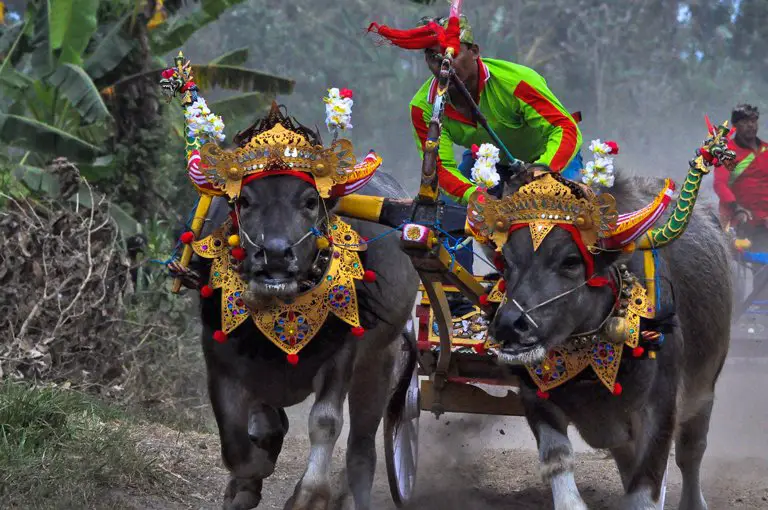
Perang Pandan - Tenganan Festival
Perang Pandan, also known as the Tenganan Festival, is a tradition that is held every year in the village of Tenganan. This festival consists of fights with weapons made out of leaves. Fights are considered a ritual of transition to adulthood and all men in the region have to go through them. Perang Pandan is a fight without any rules, and there are usually cuts and scratches produced by the edge of the leaves with which they fight, but no significant injuries. These fights are held in honor of the god of war, Indra.
Non-religious holidays and festivals
Indonesian Independence Day
On August 17, 1945, Indonesia gained its independence from the Dutch colonists. Every year, during August, many festivities are held throughout Indonesia, and celebrations can also be found in Bali. From the first day of August, the Balinese put up the red and white flags, clean up their communities, and help the people in their villages to celebrate their Indonesia’s independence.
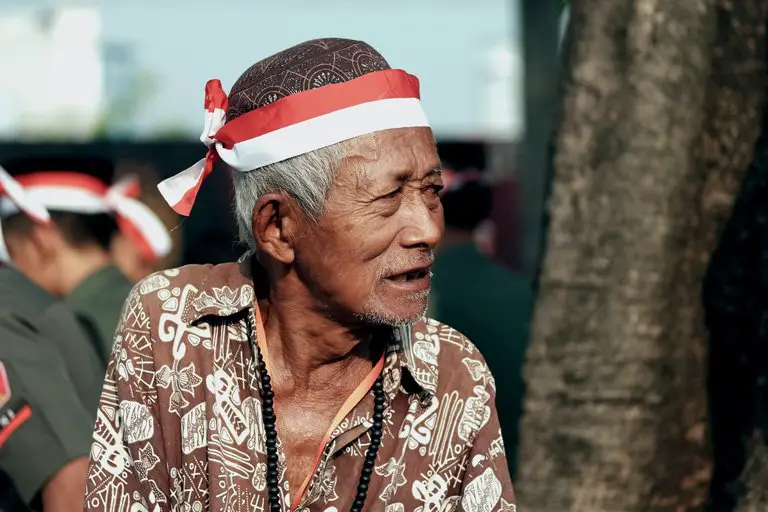
Bali Kite Festival - Sanur Kite Festival
The Bali Kite Festival is a festival held every year on the beach of Padang Galak in Sanur. During this festival, you can see huge kites in the form of fish, birds, and leaves that can be up to 10 meters long. Bali has a great tradition of kite making and flying, and during this festival, there is a traditional kite championship where several local communities compete.
Kite Festival 2020 – 15th – 18th August
Bali Spirit Festival - Yoga Festival
The Bali Yoga Festival is held every year in Ubud and attracts thousands of people from all over the world. Bali Spirit Festival lasts one week, and every day there are talks, workshops and seminars, yoga classes, dance, and music. This festival has been held for ten years, and is where you can find the best yoga teachers from around the world. In addition to all the activities related to yoga, at the Ubud Yoga Festival, you can also find a craft and clothing market, vegan food, concerts and even DJ’s.
Bali Spirit Festival 2020 – 29th March – 5th April
Bali Vegan Festival
The Bali Vegan Festival is a 3-day festival held every year in Ubud. This festival celebrates cruelty-free and aims to unite the vegan community and spread a message of kindness, compassion, and love for animals and the earth.
Bali Vegan Festival brings together world-class vegan chefs, yoga teachers, healers, musicians, comedians, environmentalists, and vegan lifestyle enthusiasts from around the world.
Bali Vegan Festival 2020 – 5th-7th October

Ubud Food Festival
The Ubud Food Festival is the annual meeting place for Indonesia’s most famous chefs, entrepreneurs, food photographers, and activists. During the Ubud Food Festival, there are different types of activities such as cooking demonstrations, workshops and masterclasses, balinese dance performances, live music, film screenings, and events for children. This festival is the ideal plan for food lovers.
Food Festival Ubud 2020 – 26th-28th June
Bali Arts Festival
The Bali Arts Festival is held every year in Denpasar, the capital of the island. This festival brings together artists, artisans, musicians, and dancers from all over the island to celebrate the arts for an entire month. The festival starts with a parade in Denpasar, and then painting, sculpture, photography, classical dance, and music exhibitions are opened to the public. There are also craft exhibitions and food stalls serving balinese food.
Bali Arts Festival 2020 – 13th June – 11th July
Ubud Writers and Readers Festival
The Ubud Writers and Readers Festival was first held in 2004 and has since become one of the world’s most prestigious literary events and an annual pilgrimage for literature lovers. Every year, writers and artists from Indonesia and many other countries attend this festival to celebrate knowledge, the arts, education, wisdom, and science. Over five days, the Ubud Writers and Readers Festival offers passionate conversations, literary luncheons, live performances, workshops, and many more activities.
2020 Ubud Writers & Readers Festival – 28th October – 1st November
Balinale - Bali International Film Festival
Balinale is the international film festival in Bali, where hundreds of films from more than 30 countries participate. Balinale broadcasts films, short films, and documentaries on various themes and is also the meeting place for national and international filmmakers. Balinale aims to promote the Indonesian film industry and new talent to give them exposure on a global level.
Balinale 2020 – 8th-13th September
Ubud Village Jazz Festival
The Ubud Jazz Festival is considered one of the best in Southeast Asia. Ubud Village Jazz Festival is an annual festival and has been held since 2010 in the gardens of the Arma Museum. This festival brings Ubud a great variety of exciting acts, a vast range of styles and sub-genres of Jazz, and the art of improvisation. Local and international artists covering all categories of Jazz attend this festival.
Ubud Village Jazz Festival 2020 – August 14 -15
As you have seen, the Balinese find every reason to celebrate, and during the year they have many festivities. We can say that in Bali, life is a carnival. They also like to celebrate Christmas and the New Year (25 and 31 December). The Balinese respect a lot the other cultures, and for this reason, they celebrate along with us the most important festivities of our calendar. For these holidays, the Balinese decorate the island with Christmas decorations, prepare family parties and throw fireworks.


